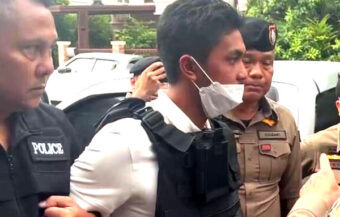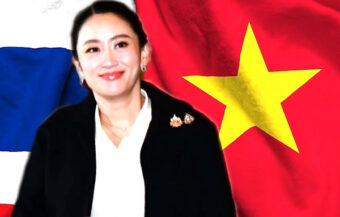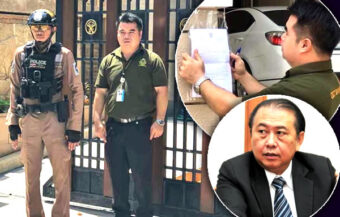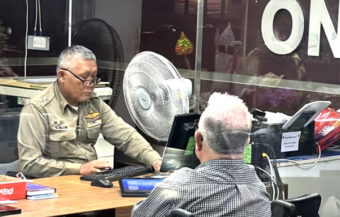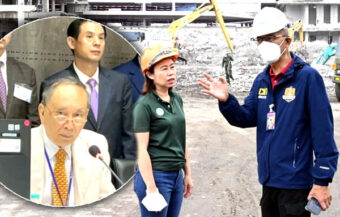On Tuesday, following a tense cabinet meeting, the Prime Minister pleaded with the public to cut back on the use of cars and air conditioning. He asked people to make sure to switch off the lights at home or at the office. This was followed by a meeting of a key committee to decide whether Thailand’s strategic oil reserves should be extended and how the kingdom can keep its Oil Fund running to keep the price of oil and energy stable while preventing a shortage of supplies. The government is being warned that anything short of swift and decisive action could see uncontrolled inflation take hold after it was confirmed that February’s headline rate came in significantly higher than expected at 5.28%.
At a cabinet meeting behind closed doors on Tuesday, the Thai Premier, Prayut Chan ocha, ordered a range of ‘answers’ to be prepared for the next meeting on March 15th as his government grapples with skyrocketing oil prices, with an advisory from JP Morgan, this week, indicating a possible surge to 300% of the level seen in 2021 as a result of the escalating war in Ukraine. There are fears that a protracted war between the Russian military and mobile Ukrainian forces supplied from the West could be on the cards or even a wider conflagration. Former Minister of Finance, Korn Chatikavanij and senior business leaders have also told the government that failure to cap the pump price of oil at ฿30 per litre could lead to runaway inflation in the kingdom which will not be easily tamed. Coming on the heels of a headline inflation rate of 5.28% for February, there are real concerns that the country could be going back to the 1970s with sky-high spikes in inflation dwarfing economic growth.
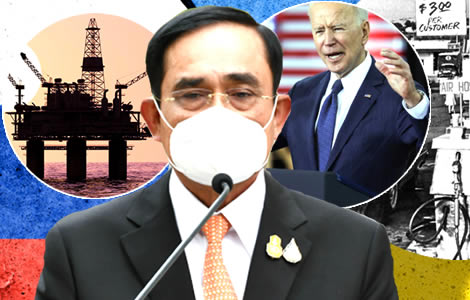
The Thai Prime Minister made the position clear to the public on Tuesday when he urged Thais to make every effort to cut back on fuel consumption including the use of cars and private vehicles.
The government leader appealed to consumers to ensure that air conditioners are regularly cleaned and that lights are switched off when not in use as well as urging the implementation of other electricity-saving measures.
Limited financial resources to cushion the impact of surging world oil prices which stunt the economy
He warned that the government had a limited financial budget to cushion the blow to consumers.
‘We’re urging everyone to help save energy as much as possible, especially in the use of private cars,’ he implored. ‘We’ve already taken steps to address the rising prices, but what should we do if they continue when we have a limited budget?’
As an interim measure, the cabinet, on Tuesday decided to cut the excise duty on diesel at the pump by ฿3 per litre until May 20th next. It currently stands at ฿5.99.
Fears for Thailand’s economy over Ukraine war with rising inflation rates and loss of confidence
Thailand’s government, this week, finds itself plunged into another crisis due to the escalation of trade sanctions and a growing realisation that the war in Ukraine, which opened up on February 24th when Russia invaded its neighbour, has turned out to be more protracted and bloody than forecast.
Grave PM presides over a tense cabinet meeting dominated by a discussion on rising crude oil prices
On Tuesday, a reportedly grave-looking Prime Minister Prayut Chan ocha presided over a tense cabinet meeting held on the premier’s orders, behind closed doors at Government House in Bangkok. Only cabinet ministers and heads of government agencies were allowed to attend.
The meeting focused on surging oil costs which have taken the government by surprise this week as the price of the commodity has scaled new peaks, approaching those seen in 2008 and which contributed to a crisis in financial markets.
At the outset of the war, there was some optimism that Thailand’s Oil fund, strategic reserves and ability to borrow funds would allow the country to cushion the potentially devastating impact of rising oil prices on the wider economy and especially the most vulnerable.
Crude oil prices from January rose by 92% up until Wednesday well ahead of market projections
In recent weeks, Auttapol Rerkpiboon, the Chief Executive Officer of Stock Exchange of Thailand (SET) listed conglomerate, PTT, Thailand’s largest firm and main oil and gas operator, quoted last month’s average price for Dubai oil at between $81 to $86 a barrel based on monthly pricing.
Thailand obtains 55% of its oil from Middle Eastern sources with only 3% of its supply coming from Russia.
That was before a 30% rise in oil prices since the Russian invasion of Ukraine on February 24th which on Wednesday 9th March, saw the price for WTI crude futures, based on West Texas Oil prices, stand at $126 a barrel.
This is a 92% rise in just under 2 months when the price stood at $65.56 on the 12th January 2022 when most forecasters were predicting a maximum value of $70 to $75 a barrel at the start of the year for 2022 and into 2023.
Brent crude on Wednesday was just over $130 a barrel.
‘Unprecedented’ challenge for Thailand
The government’s spokesman, Thanakorn Wangboonkongchana, this Tuesday, emphasised that the fallout from the war in Eastern Europe has presented Thailand with another unprecedented challenge.
He also confirmed that every effort will still be made t0 retain the policy of the current administration to keep the price of diesel at the pumps to within ฿30 per litre.
‘The challenges facing Thailand and other countries, the Covid-19 pandemic, global inflation and the Ukraine-Russia war are unprecedented and are driving fuel prices and the costs of transport and consumer goods,’ he said.
The Prime Minister tasked his ministers and senior officials at Tuesday’s cabinet meeting to prepare a coordinated plan for the next meeting on March 15th next and to have answers.
Fears of a return to 1970s stagflation with higher inflation rates dwarfing economic growth prospects
This crisis is being driven by a perfect storm of economic headwinds which threatens to derail any prospect of economic recovery this year with growing fears that Thailand may find itself in the grips of stagflation, a severe economic malaise experienced across the world in the 1970s which would herald in an era of slower economic growth and rapidly rising prices or inflation.
In 1974, for instance, at the height of the 1973/74 OPEC oil crisis, Thai inflation reached a record of 24.31% with economic growth that year at 4.47%.
Similarly, the Iranian Revolution of 1979 followed by the Iran-Iraq War saw another oil crisis where inflation spiked to 19.7% with annual growth for 1980 at 5.17%.
Forecasters in Thailand and the country’s economic policymakers have been taken aback by the country’s confirmed inflation rate for February which came in dramatically higher at 5.28% this week, approximately 25% more than expected.
Failure to maintain cheap oil prices in Thailand could spark uncontrollable inflation within the economy
The politically sensitive price of diesel also has strategic economic importance as failure to maintain low oil prices could spark uncontrollable inflation.
The limit on the price of diesel at ฿30 per litre or cap orchestrated through the country’s Oil Fund was also raised after the cabinet meeting on Tuesday by Deputy Prime Minister Supattanapong Punmeechaow, Energy Minister and the man who is also primarily responsible for economic policy under General Prayut’s government.
He referenced a meeting of the National Energy Policy Committee (NEPC) this week and admitted that the price point was under threat as a consequence of economic sanctions stemming from the war in Europe.
‘The government is trying to do all it can to maintain the cap. Meetings are being held every day to assess the oil price situation. The prices are highly volatile, jumping 50% in a week. Saving energy is now a necessity. The prime minister has instructed all agencies to propose their plans to the cabinet. The public must also help as our country still relies on imported energy,’ Mr Supattanapong said. ‘Oil prices have skyrocketed quickly, we’ll have to discuss measures to cap energy prices to avoid further impacting inflation.’
Oil Fund being discussed as planners also look at the kingdom’s strategic reserves of oil beyond 60 days
Mr Supattanapong said that officials with his ministry were in discussions with officials at both the Ministry of Finance and the Ministry of Commerce.
He indicated that any plan being developed will be to support Thailand’s Oil Fund which subsidises the cost of oil in the economy to the consumer.
One of the key considerations discussed at the National Energy Policy Committee (NEPC) meeting on Wednesday was whether to extend the kingdom’s reserves which currently stand at 60 days given the rising instability in the world including a surge in demand and costs associated with shipping.
Mr Supattanapong also suggested that an interim loan of ฿30 billion was being made available to support the Oil Fund underpinning cheap diesel at the pump for next month and that officials are looking closely at its sustainability.
‘If global oil prices continue to surge, the fund could dry up and the government may have to consider other options, including seeking more loans to support the scheme,’ he explained.
Managing oil supplier payments a short term option
He also suggested that the government agency managing the fund, the Oil Fund Office, may extend payment terms with suppliers in the short term to provide liquidity and give the government some added flexibility in what is a tightening situation.
The Oil Fund was established by prime ministerial regulation or order on the 23rd December 2004 under then PM, Thaksin Shinawatra. It gained statutory footing with the Oil Fund Act 2019.
The fund aims to both stabilise the price of oil in Thailand and to ensure the kingdom has continuity of supply.
Former Minister of Finance Korn urges officials to control the price of oil to stall rampant inflation
Former Minister of Finance and leader of the new Kla Party which polled well in January’s by-election in Bangkok, Korn Chatikavanij, has also expressed his concern over the rising pace of inflation and the confirmed official figure for February.
He has advised the government that if transport and oil prices are not strictly controlled within the kingdom, it could feed into an uncontrollable spiral of price rises across all sectors of the economy which would prove impossible to curtail later.
Mr Korn was echoing calls from the Federation of Thai Industries for the government to act swiftly and decisively on the matter.
Federation of Thai Industries boss believes the Russian Ukrainian War has destabilised the world
The scale of the challenge economically was underscored by the Vice Chairman of the body, Kriengkrai Thiennukul, who has also cautioned that the economic effects of the war from both Russia and Ukraine are already destabilising world supply chains ranging from agricultural supplies to technology and chip manufacturing materials.
At Tuesday’s cabinet meeting, officials from the Ministry of Commerce confirmed that the war has already significantly impacted not only Thailand’s export drives but is also causing severe rises in import costs.
At home, the effects of the war are already being seen. This was outlined by the industry sector boss who is also chairman of the Thai-Russian Business Council as he referred to the supplies needed by farmers to grow crops and to feed their families.
‘The prices of these raw materials have begun to increase,’ said Mr Kriengkrai this week. ‘These higher prices will lead to higher food prices and affect infrastructure development projects in many countries, leading to higher costs.’
Bank of Thailand to review inflation projections
Last week, the Bank of Thailand said it would review the country’s inflation prospects based on the fundamentally altered situation created by the war in Ukraine.
Inflation forces expected to recede in 2022 with a final annual figure projected at under 2.5%
It had earlier predicted inflation to moderate in the second half of 2022 and even this week pointed to lower than expected prices for glutinous rice used in food dishes, which has served to blunt the rate of inflation somewhat since the start of the year.
US announced a ban on Russian oil imports, the UK to phase them out with even Europe expected to act
However, the crisis may yet worsen for the government as overnight, on Tuesday, the United States President Joe Biden, by executive order, confirmed a ban on Russian oil imports which account for only 3.3% of America’s oil.
The United Kingdom also piled on the pressure after the House of Commons gave a standing ovation to embattled Ukrainian President Volodymyr Zelenskyy who addressed its members by video link from Kyiv, the first such address by a world leader. The government of Prime Minister Boris Johnson announced that it would phase out all Russian oil imports by the end of this year.
Later this week, the European Union, which depends on Russia for 25% of its oil and 40% of its natural gas imports, is planning to cut its requirement for natural gas from Russia by 66% this year while it may also acquiesce to a ban on the importation of Russian oil over a period.
Some analysts argue Russian oil and gas can be cut off, even in Europe, if matters worsen in this war
Some analysts have also suggested that the European Union could, even now, cut off Russian gas and has enough in reserve to supply demand for the rest of the year.
However, planners in Europe are anticipating bringing in gas by sea to replace the Russian supply currently delivered by the Nord Stream 1 pipeline for the Winter of 2022.
European Union planners have already confirmed that the 27 member bloc will slash its consumption of Russian gas and oil in 2022 in response to calls to sanction the country over its invasion of Ukraine.
Russia, for the first time, this week threatened to cut off the flow of gas to Europe, a move that would cost its already decimated economy up to €200 billion, a significant slice of its economy even before the war which in 2021 had an estimated GDP of $1.71 trillion.
This coordinated and unprecedented response from European countries and the United States will wreak substantial damage on an already weakened Russian economy.
McDonald’s and Starbucks to close in Russia
The scale of the crisis can be seen from the announcement on Wednesday that McDonald’s in Russia is to suspend its operation of over 850 fast food outlets across the country. It is being joined by coffee chain Starbucks and Coca Cola.
Russian President Vladimir Putin, over the weekend, described the moves from western countries as ‘a declaration of war’ and it is hard not to disagree that the escalating situation looks very similar to a state of war between the West and Russia.
In the meantime, the situation is expected to worsen with CMC Markets, a respected UK-based financial services company, predicting an oil price of $150 a barrel while JP Morgan, in a message to clients, has speculated that a price of $185 a barrel or nearly 300% more than last year’s rate, is foreseeable at this moment.
Russian tourists in Phuket cannot pay with Visa and Mastercard credit cards or withdraw cash from ATMs
The sanctions have already seen Russian tourists in Thailand stranded in Phuket and other holiday resorts across the kingdom unable to pay their bills as both their credit cards and ATMs have ceased to function while the ruble has collapsed in value. The Russian currency has lost over half its value since the beginning of 2022 due to the crisis and now war over Ukraine.
World lives in fear – UK Minister says Putin may not be in his ‘right mind’ as Thursday’s invasion goes awry
Given the already tense and deteriorating relationship between America supported by its western allies and China, which this week has been increasingly supportive of Russia economically while also experiencing its own financial and economic turbulence, the rising spectre of world insecurity only drives fears of runaway inflation and a tanking economy not only in Thailand but across the world.
Join the Thai News forum, follow Thai Examiner on Facebook here
Receive all our stories as they come out on Telegram here
Follow Thai Examiner here
Further reading:
Thailand should move more towards a circular economy as the country faces intractable hurdles
Thailand’s economy awaits the fallout from the Omicron surge as projections for 2022 take a dive
Inflationary fears for Thailand more muted than in the United States but planners should prepare
A cautious recovery in 2022 says Bank of Thailand boss but PM strikes a mildy more optimistic note
With Omicron hovering, firms already suffering a cash flow crunch with the economy again in peril
Shaky economic recovery as planners target only a 1% gain in 2021 with rising headwinds in Quarter 4
Economy climbing out ‘of a hole’, foreign firm’s confidence levels rose sharply during October
Another GDP contraction looms as Thailand tries to boost its economic fortunes by spending more
Government borrows more to bring the economy through an extended Covid 19 crisis with GDP flat
Officials switch to prioritising economic recovery as CCSA expected to agree a new Covid approach
Rising prospect of GDP contraction for 2021 may see government breach the legal public debt limit
Economic fears rising as Thailand faces a bigger crisis than 1997 with rising job losses and debt
Baht falling with confidence in Thailand waning as foreign tourism closure and virus drive funds out
Central bank to lower GDP growth forecast as its attention turns to private sector debt management
Loan bill passes but Thai economic prospects are not bright with a 1.8% 2021 GDP gain predicted
IMF urges government to loosen nation’s purse strings as finances tighten with the tax take down
Failure to pass the ฿500 billion borrowing decree could lead to the dissolution of parliament
Industry leaders and central bank all warn that foreign tourism must return to avoid a collapse
Fact – only 6,556 visitors arrived in Thailand last month compared to 3.95 million in December 2019
Desperate foreign tourism business concerns are clinging to straws as they try to survive the crisis
Challenge of the virus and closure to tourism leads to major long term changes in the Thai economy
Finance Minister says economy must pivot away from tourism with a switch to S-Curve industries
Strengthening baht predicted as investors bet on a reopening of Thailand to mass tourism in 2021
Thailand facing a credit crunch as 3rd virus wave craters the kingdom’s economic recovery plans
3rd virus wave now spells not just economic loss but financial danger as kingdom’s debt level rises
Still time to avoid lockdown says Health Minister as 3rd virus wave dwarfs all infections to date
Thai economy is still in reverse despite rising confidence and a virus threatening a 3rd wave
Reopening of Phuket still not officially approved although it is the ideal test for a broader move
Minister urged not to be afraid to borrow in 2021 as fears grow for a quick foreign tourism revival
Economy to rebound as the year progresses driven by exports and a return of mass foreign tourism
Door closing on quick foreign tourism return as economic recovery is delayed to the end of 2022
Fact – only 6,556 visitors arrived in Thailand last month compared to 3.95 million in December 2019
Desperate foreign tourism business concerns are clinging to straws as they try to survive the crisis
Finance Minister says economy must pivot away from tourism with a switch to S-Curve industries


